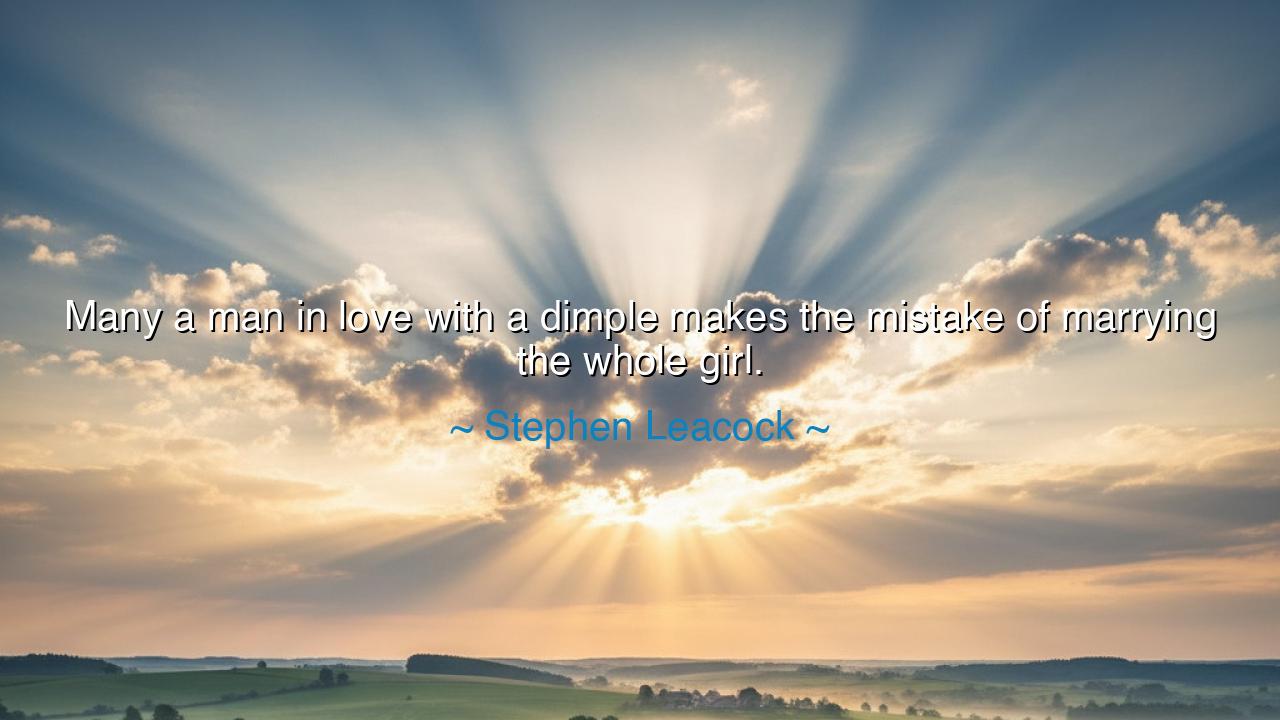
Many a man in love with a dimple makes the mistake of marrying






The words of Stephen Leacock—“Many a man in love with a dimple makes the mistake of marrying the whole girl.”—carry the laughter of wit but the gravity of wisdom. Beneath the humor lies an ancient truth about human folly: that the heart, when overtaken by desire, often mistakes a fragment for the whole, and infatuation for love. Leacock, the great humorist of the early twentieth century, wrote with the insight of one who saw how easily people confuse charm with character, beauty with depth, and momentary fascination with enduring devotion. His jest, light as air, conceals a serious warning—do not build a lifetime on what dazzles for a moment.
The origin of this quote arises from Leacock’s gift for blending comedy and moral reflection. In his essays and lectures, he often mocked the vanities and follies of human behavior while revealing their deeper meaning. This saying belongs to that tradition: a humorous strike at the romantic impulsiveness that leads people into mismatched unions. He saw that many enter marriage not because they understand the soul of the one they choose, but because they are bewitched by a single feature—a smile, a gesture, a dimple—that awakens desire but conceals the vast and complex person beneath. Thus, the one who falls in love with an image finds, too late, that marriage is not the joining of faces, but of lives.
When Leacock speaks of a “dimple,” he means not merely a physical charm, but any surface quality that captures attention and blinds reason. It may be beauty, wit, wealth, or even mystery—whatever glitters brightly enough to lure the heart away from discernment. The “whole girl”, in contrast, represents the full truth of a person: her virtues, her flaws, her moods, her history. To marry the whole person without first seeing who she truly is is to commit the gravest error of love—to mistake illusion for essence. The wise must learn to love with open eyes, for affection that sees only the delightful cannot endure the ordinary.
The ancients understood this truth well. In the myth of Paris and Helen, Paris saw only beauty and was blinded by it. His passion for the fairest woman in the world led not to joy, but to ruin—the fall of Troy. His heart was captured by Helen’s outward grace, but he never saw the cost her beauty carried, nor the shadows that came with it. So too do many lovers chase an image without reckoning its weight, discovering only later that the same loveliness that entranced them can also destroy their peace. Thus, Leacock’s jest is not mockery of love, but a call to love wisely—to see not only the smile but the soul behind it.
In life, this lesson unfolds daily. How often do people bind themselves in haste, enchanted by the first light of passion, only to find that their hearts have been pledged to strangers? The laughter fades, and what remains are the habits, the temper, the silences, and the unspoken differences that must be faced. Marriage is not a poem recited once, but a story written day by day. Those who marry for a “dimple” soon learn that beauty cannot soothe anger, and charm cannot replace loyalty. True love begins when illusion dies, and what remains is seen clearly yet cherished still.
Yet there is no bitterness in Leacock’s words—only wisdom tempered by humor. He does not scorn romance; he reminds us that it must be tempered by truth. Love that endures must embrace the “whole girl”—or the whole man—with all their faults and frailties. To truly love is to see clearly and choose still, to accept that perfection is an illusion, and that the soul’s beauty matters more than the body’s allure. The wise do not flee from imperfection; they build their love upon it, turning weakness into understanding and difference into harmony.
So let this teaching pass down through the ages: do not fall in love with a dimple—fall in love with a life. Look beyond the smile to the character that sustains it. Ask not only what delights you, but what you can endure, what you can nurture, what you can forgive. For marriage is not the celebration of infatuation, but the cultivation of companionship. To love rightly is to love wholly—to see both the light and the shadow and call them by the same name. Then, and only then, can one avoid the folly that Leacock so wittily revealed, and discover in another not a fleeting charm, but a lasting soul.






AAdministratorAdministrator
Welcome, honored guests. Please leave a comment, we will respond soon